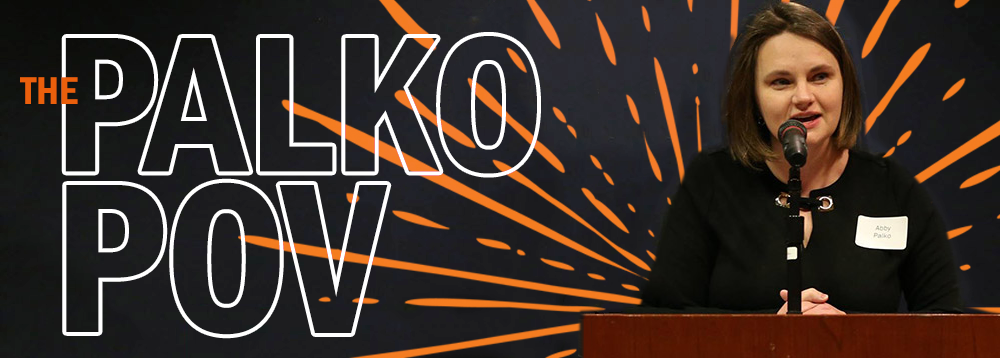
Humans tell stories to make sense of life. We like neat analogies.
Boy : blue :: girl : ____. If you reflexively answered "pink," you've probably 1) been prepped for the SAT and 2) been socialized into an American understanding of gender differences (and if you think that analogy has always been so, that's anachronistic.)
But the differences in the ways that masculinity and femininity are understood and socialized aren't neatly parallel. Gendered roles impact men and women disproportionately. Women are told they can't, men are told they shouldn't. There's a world of difference between "can't" and "shouldn't."
I kicked off March by traveling downtown to the 10th annual Quadruplicity conference, a daylong gathering hosted by the Charlottesville Regional Chamber of Commerce and designed as a networking and professional development event for women of a wide variety of professions at all stages of their careers. Dean Risa Goluboff, UVA Law School's first female dean, opened the conference. One of her key takeaways – which I wholeheartedly second! – is that women who want to pursue professional success and motherhood should choose their partner carefully.
This is advice I've heard—and even given myself—many times over the years. A woman who has achieved a particular level of professional success while having children often finds herself being asked what her secret is. Frankly, given the lack of structural support for parents here in the US, the answer is often an individual cobbling together of time and effort. But that's neither pithy nor inspirational, and the impulse to fall back on the aforementioned "choose your partner wisely" is understandable, with the implication being, "choose someone who will support you, not hold you back or create more work for you."
My family moved to Charlottesville last July and as I've met new people across Grounds and in the community, I've been asked multiple times if we moved for my husband's job. Some are surprised when I explain that no, we moved for mine. And in fact, this is the second interstate move he's made for me. We were very fortunate that he was in a position to be able to agree to each move once we determined it was in our family's best interests, as I'm quite aware that not everyone can do so. But I am grateful that he would consider making it. It's that second half that is part of the nebulous "choose wisely" advice, at least when I'm offering it.
We've seen declines in marriage rates and changes in the reasons people marry over the past century, with these trends intensifying in the past couple of decades. Choose your partner wisely is the subtext beneath a lot of popular advice that's currently pitched at a particular kind of woman, namely one who's college-educated and ambitious. As a recent Gallup poll shows, both men and women see work-life fit or integration as the greatest challenge that women face globally.
This is one of the reasons I'm so invested in our Men's Leadership Project (MLP), which provides mentoring opportunities to UVA men and mentorship to Charlottesville area boys. Not only does a program like MLP help men develop healthier conceptualizations of masculinity for themselves, it provides them with concrete experiences to draw upon if they form their own families.  Full integration of women into the public sphere requires rethinking entrenched notions of the ideal worker and the ideal caretaker. The visual holds great power to meet this challenge. I remember watching a commercial with my daughter a few years ago. Halfway through, Nora started laughing. When I asked what was funny, she said, “That’s a silly ad. Mommies don’t do laundry!” This was not the answer I expected, but then I realized she had only ever seen my husband do the laundry. She had learned that laundry is a masculine task.
Full integration of women into the public sphere requires rethinking entrenched notions of the ideal worker and the ideal caretaker. The visual holds great power to meet this challenge. I remember watching a commercial with my daughter a few years ago. Halfway through, Nora started laughing. When I asked what was funny, she said, “That’s a silly ad. Mommies don’t do laundry!” This was not the answer I expected, but then I realized she had only ever seen my husband do the laundry. She had learned that laundry is a masculine task.
For some people, the vision I sketched above is scary. Clear-cut gender roles can provide comfort for people who dislike ambiguity. There is a level of security that people can derive from following gender norms. A traditional submissive role can relieve women of the pressures inherent in pursuing more autonomy; a traditional breadwinner role offers men a way of confirming their masculinity. Data from a recent time use study analysis suggests that men do less housework when their wives outearn them. Dismantling the patriarchal system with its rules that we all understand (whether or not we accept them) disrupts a way of life that some people have willingly adapted to, and that others have enthusiastically adopted. As much as humans tell stories to make sense of life, they create systems to make sense of life in community. Systems that tell women they can’t have a career and a family, systems that tell men they shouldn’t take on caretaking responsibilities, for example.
So much is implied when we suggest that a young woman “choose wisely”: that she knows what she wants, that she knows what supports will facilitate achieving it, that she knows how to identify and ask for those supports. In a culture that isn’t set-up well to support women working and mothering, it is tempting to think that an ambitious, high-achieving, driven young woman can beat that system by choosing the right partner. Further reflection reminded me of just how simplistic the vision I’ve laid out above is… but that’s a conversation for another post.
This is one of many posts to come in our new blog series, The Palko POV. As the Director of the Women's Center, Abby Palko has a rich array of interactions in the UVA community far and wide and we'll bring you the insights she gains from those here. Stay tuned!

